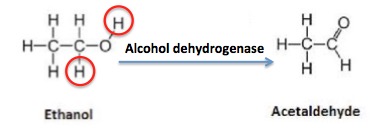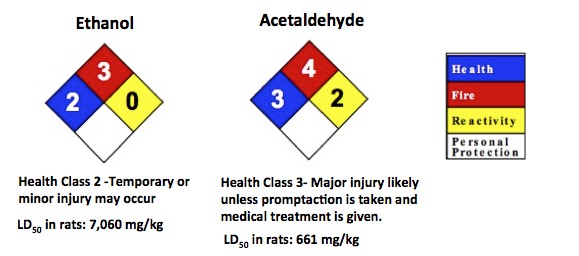There are good prescription drugs, bad ones, and then there is Antabuse (generic name disulfiram). It is both. Antabuse works, but you'd better give it plenty of respect.
As the name implies, Antabuse is used to prevent alcoholics from drinking. It sure works for that, but so does killing a mosquito by sitting in a room with it, and pulling the pin on a hand grenade. Effective? Yes. Subtle? Not so much. Yet, when subtlety doesn't work you might need the hand grenade. Sometimes alcoholism requires that the grenade is used.
Disulfiram has exactly one job - to poison you if you drink any alcohol, and does so readily. If you've taken the drug and have even one sip of alcohol within the next few days (1) life is going to be mighty unpleasant, since things you never knew existed, perhaps alien life forms, will be flying out of your mouth. Think The Exorcist (minus the spinning head).
The reason you will be so sick also explains why some Asians cannot drink alcohol (2). A sub-group of Asians have a genetic condition that prevents them from completely metabolizing alcohol. Disulfiram acts in a very similar way - by inhibiting one of the two distinct steps required for metabolism.
Step 1: Ethanol is oxidized (hydrogen atoms removed) in the liver by an enzyme called alcohol dehydrogenase, which converts the alcohol into acetaldehyde, a toxic metabolite. If the name of an enzyme contains "dehydrogenase," then it's a sure bet that it will promote an oxidation (hydrogen atoms removed). The red circles in ethanol (left) depict the hydrogen atoms that are removed during the oxidation process (3). Conversely, if part of the enzyme's name contains "hydrogenase," it will promote the opposite reaction- a reduction (hydrogen atoms added).

Step 2: The acetaldehyde is further metabolized, again by oxidation, by a different enzyme called acetaldehyde dehydrogenase. This enzyme serves to detoxify acetaldehyde by converting it into harmless acetic acid. Again, the red circle depicts the loss of hydrogen during the reaction.

Acetaldehyde is just plain nasty. Figure 1 shows a ballpark comparison of its acute toxicity with that of ethanol. As determined by a lethal single dose in rats, acetaldehyde is about 10-times more toxic than ethanol. Acetaldehyde toxicity is also largely responsible for the symptoms of hangovers.

Figure 1: Relative toxicity of ethanol and acetaldehyde. Source: Fisher Scientific Material Safety Data Sheets
Consuming alcohol with Antabuse will certainly make people sick, but does this help them stop drinking? Yes, it does. Sometimes. If they use it correctly. Following are some selected quotes from patients who have taken Antabuse. (The comments can be found on the website Drugs.com.)
For some it works beautifully (4):
"Absolutely changed my life and made sobriety possible. Should be prescribed more often."
"I finally feel relieved that I have control over my craving to drink every day. I am really happy that I can go into a bar and hang out with my friends and not drink. I [have] basically been drinking since 15."
"If anything the Antabuse works TOO well for me! It makes me super sensitive to any alcohol....whether it's in the hand sanitizers, nail polish removers, colognes (even on other people around me)..."
But you'd better not cheat:
"I have tried this medication without success. When my cravings became too difficult I would stop taking the medication and plan my drinking for 4 to 5 days later which sometimes wasn't enough time to get the medicines out of my system and became very ill.
[I was] witnessing one of the sickest people I've ever seen due to one drink while taking this medicine, I'm scared for him. He literally was bright red, his body was on fire and the sickness he felt was something he had never felt before and never wishes that he had drank. He was in massive pain
And some people can't tolerate the side effects of the drug (5):
I never knew that Antabuse had any sexual side effects, until now. This is a concern to me. Drowsiness, tiredness, tingling in my feet, are further side effects.
So, in a sense, Antabuse is similar to many other drugs. It works for some, not for others, and some can't take it at all. And like standard cytotoxic chemotherapy, it acts as a poison. But about 90,000 people die every year from alcohol. That's an even bigger poison.
NOTES:
(1) Even after two weeks, Antabuse can still make you sick after drinking, although many people may get away with drinking about four days after the last dose of the drug. This is not an experiment you want to run.
(2) The Asians who are not able to metabolize alcohol completely but still drink get what is called the "Asian Flush" - one of the effects that drinkers who are taking Antabuse suffer. It is caused by acetaldehyde. See Alcohol Is Racist: Unhappy New Year For Some
(3) It's not really so simple. The enzyme catalyzes the reaction, but not on its own. It requires a coenzyme - a molecule that works together with an enzyme to promote a biochemical transformation, in this case, an oxidation-reduction (redox) reaction. In this case, as in very many, the coenzyme is called nicotinamide adenine dinucleotide (NAD+), which carries out the oxidation. In the process, NAD+ is converted to NADH, its reduced form. The interconversion of NAD+ and NADH is hugely important and plays an essential role in many biochemical reactions, such as the production of energy by metabolism of nutrients.
(4) Some people are so sensitive to alcohol while on Antabuse that they must avoid ketchup, hot sauces, some types of vinegar, mouthwashes, perfume, hand sanitizers...
(5) Side effects from the drug include skin rash, acne, headache, drowsiness, tiredness, impotence, metallic taste or garlic-like taste in the mouth, weakness, loss of appetite, upset stomach, vomiting, yellowness of the skin or eyes, dark urine. Source: MedLine Plus




